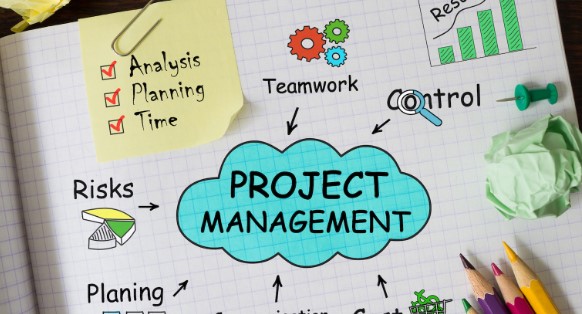The Essentials of Project Management
Introduction
In a world driven by innovation, efficiency, and change, effective project management has become the linchpin that holds together the many moving parts of complex endeavors. Whether you’re launching a new product, implementing a large-scale IT system, or constructing a skyscraper, project management is the framework that ensures you reach your destination on time and on budget. In this guest post, we will explore the key essentials of project management, from its core principles to best practices for achieving successful outcomes.
The Significance of Project Management
Project management is the practice of planning, executing, and overseeing a project’s goals and objectives while managing the constraints of time, scope, and resources. Its importance cannot be overstated, and it is applicable to a wide range of industries and endeavors. Here are some compelling reasons why project management is indispensable:
1. Efficiency and Productivity
Project management optimizes processes, reducing inefficiencies and redundancies. Well-organized projects are more likely to be completed within time and budget constraints.
2. Quality Assurance
Project management focuses on quality throughout the project’s lifecycle, ensuring that the final deliverables meet or exceed the expected standards.
3. Risk Mitigation
Identifying and addressing potential risks is a core aspect of project management. By developing risk management strategies, project managers can reduce the likelihood of setbacks.
4. Resource Allocation
Efficient resource allocation is vital for any project. Project management ensures that resources are used effectively and economically, minimizing waste.
5. Communication and Collaboration
Effective communication and collaboration among team members are critical to project success. Project management emphasizes open lines of communication and teamwork.
6. Strategic Alignment
Projects must align with the organization’s strategic goals. Project management ensures that each project is contributing to the bigger picture.
The Essentials of Project Management
Effective project management is a multifaceted discipline that incorporates a set of essential principles, processes, and tools. Let’s delve into these essentials:
1. Project Initiation
The initiation phase is where a project is born. It involves defining the project, its goals, stakeholders, and overall scope. The initiation phase is crucial because it lays the foundation for everything that follows.
2. Project Planning
During the planning phase, the project manager and the team develop a detailed plan that outlines the project’s scope, timeline, budget, and resources. This phase involves risk assessment and setting realistic expectations.
3. Project Execution
Execution is the phase where the actual work takes place. It involves coordinating people and resources to carry out the project plan. Effective communication and progress tracking are essential in this phase.
4. Monitoring and Controlling
This phase runs concurrently with execution. It involves tracking project progress, managing changes, and ensuring that the project stays on course. The project manager must maintain control over the project’s scope, schedule, and budget.
5. Project Closure
Once the project objectives are met, the project manager initiates the closure phase. This involves handing deliverables to stakeholders, ensuring all project documentation is complete, and conducting a final project review.
6. Quality Management
Quality management is integral to every phase of the project. It includes defining quality standards, ensuring compliance, and addressing any quality issues that arise.
7. Risk Management
Identifying, assessing, and mitigating risks are ongoing processes in project management. A risk management plan helps the project manager anticipate and address potential challenges.
8. Communication Management
Effective communication is vital in project management. The project manager must establish communication channels, facilitate regular meetings, and ensure stakeholders are well-informed.
9. Stakeholder Management
Stakeholders play a crucial role in any project. Managing their expectations and needs is an essential aspect of project management.
10. Resource Management
Resource management involves allocating and optimizing resources, including personnel, equipment, and finances, to meet project goals efficiently.
11. Change Management
Projects often encounter changes in scope, requirements, or objectives. Project managers must have effective change management strategies in place to handle these adjustments.
12. Documentation and Reporting
Thorough documentation is key to project management. It provides a historical record, ensures accountability, and helps with future decision-making.
Best Practices in Project Management
While the essentials provide a robust framework, adhering to best practices can further enhance the success of a project. Here are some best practices in project management:
1. Set Clear Objectives
Project objectives must be specific, measurable, achievable, relevant, and time-bound (SMART). Clarity is essential for all stakeholders.
2. Select the Right Project Manager
Choosing the right project manager is critical. They should possess the necessary skills, experience, and leadership qualities.
3. Involve Stakeholders from the Start
Engage stakeholders from the initiation phase to ensure that their needs and expectations are considered throughout the project.
4. Use Project Management Software
Project management software can streamline project planning, tracking, and reporting. It enhances collaboration and keeps information organized.
5. Implement Agile and Scrum Methodologies
Agile and Scrum methodologies emphasize flexibility and adaptability. They are particularly effective for software development and complex projects.
6. Regularly Review and Adjust
Frequent project reviews and adjustments are essential. This ensures that the project remains aligned with its objectives and that any issues are addressed promptly.
Conclusion
Project management is a critical discipline that drives efficiency, quality, and success in a wide range of endeavors. Its principles and processes provide a structured approach to achieving project goals and managing constraints.
As projects become increasingly complex and the business landscape evolves, project management continues to be a key driver of success. By understanding the essentials and best practices of project management, organizations can navigate the path to success with confidence and efficiency, ensuring that projects are completed on time, on budget, and with the desired level of quality.

